Class 9 Civics Chapter 1 Extra Question Answers - What is Democracy?
1) Which of the following is in favour of democracy?
(a) Leaders keep changing
(b) Delays are often made in taking decisions
(c) The dignity of the citizen is enhanced
(d) Political competition is very prominent
Ans: (c)
2) Which reason is responsible for the death of nearly three crore people in China's famine of 1958-1961?
(a) Presence of democracy
(b) Absence of democracy
(c) Government's negligence
(d) Weak economic policy
Ans: (b)
3) I have heard a different version. Democracy is off the people far (from) the people and (where they) buy the people. Why don't we accept that?
Ans: In some cases, the democracy is off the people far (from) the people and (where they) buy the people i.e., where the democracy does not belong to the people it is not for them but far away from them, where the democracy is not by the people but the candidates the votes with money which means that true democracy does not exist. But we should not see these examples and be hopeless. These cases are exceptions and not the rule, which will be removed with the passage of time.
4) Let us take Lyngdoh Madam seriously and try to write down the exact definition of some of the simple words that we use all the time: pen, rain and love. e.g., is there a way of defining a pen that distinguishes it clearly from a pencil, a brush, chalk or crayon?
(i) What have you learnt from this attempt?
(ii) What does it teach no about understanding the meaning of democracy?
Ans:
(i) From this conversation, I have learnt that there is no shortest to our thinking about the matter ourselves. We have to think about its meaning and evolve a definition. Each and everything has some specific features on the basis of which we can define that thing.
(ii) We need a definition only when we come across a difficulty in the use of a word. We need a clear definition of democracy because there are different kinds of governments which are known as Democracy. Abraham Lincoln said that Democracy is a rule of the people, for the people and by the people. We must not accept the definition, jug. because everyone accepts it. We do not know if this is the best way of defining democracy unless we think about it ourselves. After thinking about it we can say that democracy is a form of government in which the rulers are elected by the people. This is a common basic feature of democracy.
5) Ribiang went back home and collected some more famous quotations on democracy. This time she did not mention the names of the people who said or wrote these. She wants you to read these and comment on how good or useful these thoughts are
(i) Democracy gives every man the right to be his own oppressor.
(ii) Democracy consists of choosing your dictators after they, have told you what you think it is you want to hear.
(iii) Man's capacity for justice makes democracy possible, but man's inclination to injustice makes democracy necessary.
(iv) Democracy is a device that ensures we shall be governed no better than we deserve.
(v) All the ills of democracy can be cured by more democracy.
Ans: The first and second thoughts are about those forms of government in which the people have the right to elect their ruler without having options. It means they have to elect the candidate only from the ruling party. In the third thought, it suggests that if man accepts justice, then democracy is possible. But when the man follows injustice, democracy is necessary there to give justice to others. The fourth thought, suggests that there must be a balance between the form of government and our need. The strongest argument for democracy is about what it does to the citizens. Democracy recognises our needs and enhances our dignity. In the last thought, there is scope for changing the features and activities of democracy as per our need. There is no guarantee that mistakes cannot be made in a democracy. The advantage is that there is room for correction. Either the rulers have to change their decisions or the rulers can be changed. In this way, the ills of democracy can be cured.
6) This cartoon was drawn when elections were held in Iraq with the presence of US and other foreign powers.
(i) What do you think this cartoon is saying?
(ii) Why is 'democracy' written the way it is?
Ans: (i) The cartoon is saying that democracy is being established in Iraq with the help of the US military power.
(ii) Democracy is written in this particular way because it shows that it is not true democracy and it is a mockery of democracy set up by the US for its own interest. Democracy is being ridiculed in this cartoon.
7) Syria is a small West Asian country. The ruling Ba'ath Party and some of its small allies are the only parties allowed in that country.
(i) Do you think this cartoon could apply to China or Mexico?
(ii) What does the crown of leaves on democracy signify?
Ans: (i) Yes, this cartoon could be applied to China, because there is a one-party rule in China. Before contesting elections, a candidate needs the approval of the Chinese communist party. So China cannot be said to be a true democracy. Mexico has a multiparty system. Nationally there are three large political parties, viz, Institutional Revolutionary Party (IRP), National Action Party (NAP), and Party of the Democratic Revolution (PDR). But until 2000 every election was won by the PRI. The PRI was known to use many dirty tricks to win elections. So the cartoon can be applied to Mexico until the 2000 election. But in 2006, election PRI fell to third place behind both the PAN and the PRD. Now Mexico has a coalition government.
(ii) Crown of leaves means a circle of leaves that is worn on somebody's head as a sign of victory. The cartoon signifies that democracy has won in some of the countries of the world, but it is not accepted by all.
8) This cartoon was drawn in the context of Latin America.
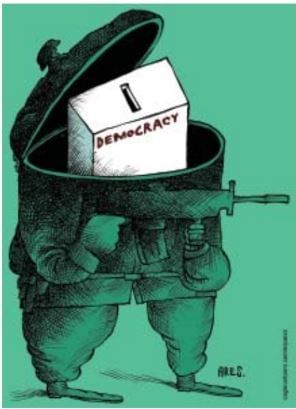
(i) Do you think it applies to the Pakistani situation as well?
(ii)Think of other countries where this could apply?
(iii) Does this happen sometimes in our country as well?
Ans:
(i) The cartoon suggests the scene of booth capturing with the gun. This can be applicable to Pakistan. In Pakistan, General Musharraf with the help of army officials controlled the elected representatives.
(ii) This could be applied in Iraq, China, etc.
(iii) Booth capturing by the political hooligans happens sometimes in our country also.
9) All this is so remote for me.
(i) Is democracy all about rulers and governments?
(ii) Can we talk about a democratic classroom?
(iii) Or a democratic family?
Ans:
(i) Democracy is not only about rulers and governments. Democracy is a principle that can be applied to any sphere of life. A democratic decision involves consultation with and consent of all those who are affected by that decision. In this sense, it can be applied to any organisation other than the government.
(ii) We can have democratic classrooms where the students can ask questions without hesitation. Where the teachers have a democratic temperament. Where the interaction is not one-way traffic but a healthy two-way interaction.
(iii) Democracy can be seen in families also. We could have democratic families where the decisions are not taken by any one individual and imposed on the rest of the family members. All the family members should sit down and arrive at a general consensus. My opinion should matter as much as my father's. In this way, we can have, democracy in our family also.
10) This cartoon was titled 'Building Democracy' and was first published in a Latin American Publication.
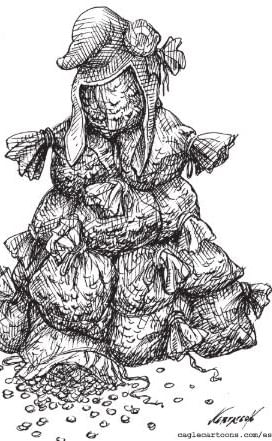 (i) What do money bags signify here?
(i) What do money bags signify here?
(ii) Could this cartoon be applied to India?
Ans:
(i) At the time of the election, the political parties in the fray spend a lot of money to win the election. Not only political parties, the government also spends a lot of money to conduct a free and fair election. The cartoon suggests that we establish democracy with the help of money power.
(ii) Yes, this cartoon could be applied to India.
11) This cartoon is about the Iraqi election held after Saddam Hussein's regime was overthrown. He is shown behind the bars.
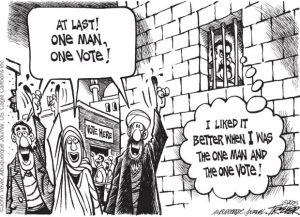 (i) What is the cartoonist saying here?
(i) What is the cartoonist saying here?
(ii) Compare the message of this cartoon with the first cartoon in this chapter.
Ans:
(i) In one of the quotations of the cartoon, the cartoonist tells us about the equality of the right to vote and equal value of each man's vote. In another quotation, he says that the dicta top mostly prefers the situation when he is the only man to decide any matter by his only vote.
(ii) The first cartoon shown in two chapters suggests that the US army personnel are elevating the process to form a democracy in Iraq. But in this cartoon, the message is that democracy is already established.
12) (i) Why talk about Zimbabwe?
(ii) I read similar reports from many parts of our own country. Why don't we discuss that?
Ans: (i) The President of Zimbabwe is the head of the state of Zimbabwe. In 1987, Robert Mugabe becomes the president and he revises the Constitution to make himself Executive President. President Mugabe is popular but also uses unfair practices in elections. Opposition party workers are harassed, public protest and demonstration against the government are declared illegal, both print and electronic media are controlled by the government. The government has pressurised judges to give verdict in favour of the government. The example of Zimbabwe shows that popular approval of the rulers is necessary for a democracy, but it is not sufficient. A democratic government cannot do whatever it likes, simply because it has won the election. This is the reason for which Zimbabwe is discussed here.
(ii) Our country is democratic and elections are by and large free and fair. However, sometimes we hear reports about the use of unfair means, violence and money power in elections. These tactics (methods) are adopted by some candidates with criminal connections or criminal background. However, such cases are decreasing day by day.
13) Chinese Government blocked the free flow of information on the internet by placing restrictions on popular websites like 'Google' and 'Yahoo'. The image of tanks and an unarmed student reminds the reader of another major event in recent Chinese history. Find out about that event.
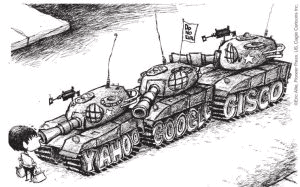 Ans: The cartoon reminds us of the Massacre in Tiananmen square in 1989. In April 1989, triggered by the death of Hu Yaobang, a liberal reformer, mass gathering and protests took place in and around Tiananmen Square in Beijing. It was largely a student-run demonstration that called for economic reform, freedom of the press and political liberalisation. The Chinese government brutally suppressed the movement for which it was internationally
Ans: The cartoon reminds us of the Massacre in Tiananmen square in 1989. In April 1989, triggered by the death of Hu Yaobang, a liberal reformer, mass gathering and protests took place in and around Tiananmen Square in Beijing. It was largely a student-run demonstration that called for economic reform, freedom of the press and political liberalisation. The Chinese government brutally suppressed the movement for which it was internationally
14) Read these five examples of working or denial of democracy. Match each of these with the relevant feature of democracy discussed above.
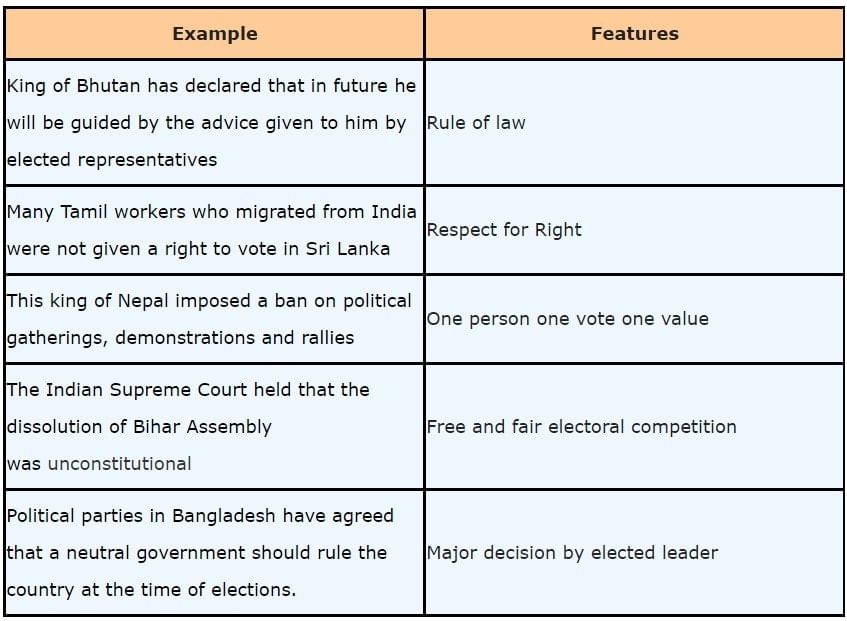
Ans:
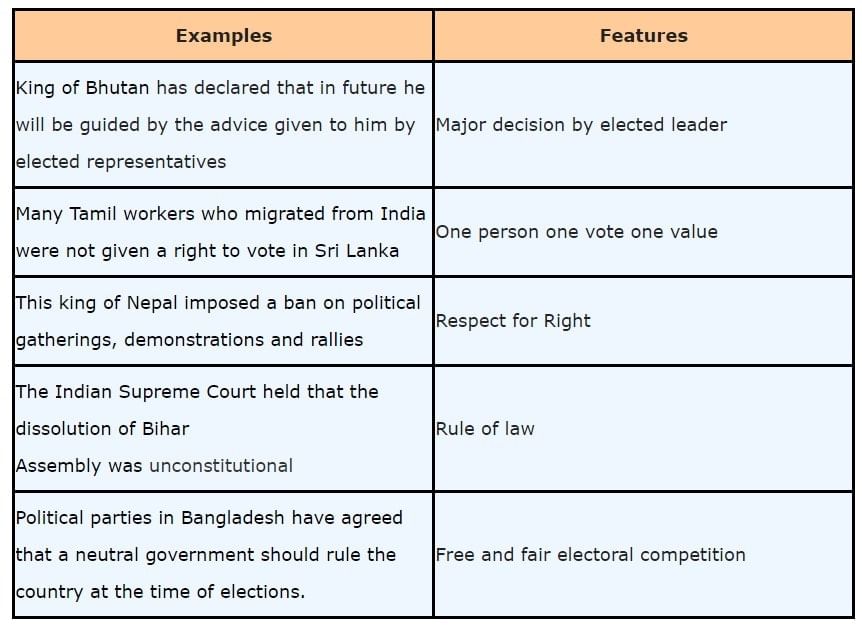
15) I want to be in Lyngdoh Madam's class! That sounds like a democratic classroom, doesn't it?
Ans: Yes, Lyngdoh Madam's classroom sounds like a democratic classroom. Here everybody can speak his own mind. The students are giving their own arguments passionately. They feel very bad if someone that the environment in the classroom is democratic.
16) This cartoon is from Brazil, a country that has long experience of dictatorship. It is entitled The Hidden Side of Dictatorship'
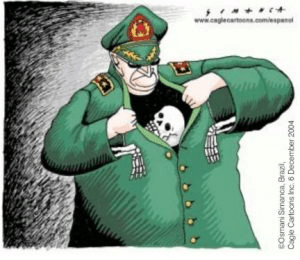 (i) Which hidden sides does this cartoon depict?
(i) Which hidden sides does this cartoon depict?
(ii) Is it necessary for every dictatorship to have a hidden side?
(iii) Find out the dictators discussed in the first chapter and, if possible, about Abacha in Nigeria and Macros in the Philippines.
Ans:
(i) The hidden side depicted by the cartoon is the brutal side to the dictator. Dictator like Hitler ordered mass killings to eliminate 'undesirable' persons like Hitler many dictator killed the innocent people who were against their regime. This evil side of the dictator is shown in this cartoon.
(ii) No, it is not necessary for every dictatorship to have a hidden side. Because, if the dictator really wants to work for the betterment of people, he does not need to have a hidden side.
(iii) (a) The revolt by the army took place in Chile on 11th, September 1973 under General Augusto Pinochet in which President Salvador Allende was killed. Pinochet became the president of the country and ruled it for the next 17 years.
(b) Wojciech Witold Jaruzelski was the last communist leader of Poland who was the head of the state from 1985 to 1990. He resigned from power after the Polish Round table Agreement in 1989 that led to democratic elections in Poland.
(c) General Sani Abacha was a Nigerian military dictator and politician. He was the defacto president of Nigeria from 1993 to 1998. His regime was tied to human rights violations and allegations of corruption. He hanged the famous social activist Ken Saro-Wiwa. He did not allow democratic process like elections in Nigeria He was listed as the world's fourth most corrupt leader in recent history.
(d) Ferdinand Emmanuel Edralin Marcos was the president of the Philippines from 1965 to 1986. He implemented wide-ranging programmes of infrastructure development and economic reform. However, his administration was marred by massive authoritarian, political repression and human rights violations. In 2004, Global Transparency Report, Marcos appeared on the list of the world's corrupt leader. He was said to have amassed between $ 5 billion to $ 10 billion in his 21 years as President of the Philippines.
17) What would have happened if India was not a democracy? Could we have stayed together as a single nation?
Ans: No, we would have not stayed together as a single nation if India was not a democracy. India has multi-religious, multi-cultural and multi-linguistic population. If there was no democracy then all the people could not have followed their religion and customs with freedom and there would have been conflicts between different religious and linguistic groups where the minorities would have lived in fear and insecurity. But democracy provides the peaceful solutions to every problem. It provides the best method of dealing with differences and conflicts.
18) Why is democracy considered the best form of government?
Ans: Democracy cannot give us everything but is clearly better than any other alternative. It offers better chances of a good decision, it is likely to respect people's wishes and allows different kinds of people to live together. Even when it fails to do some of these things. It allows a way of correcting its mistakes and offers more dignity to all citizens. That is why democracy is considered the best form of government.
19) How does democracy allow us to correct its own mistakes?
Ans: There is no guarantee that mistakes cannot be made in a democracy. No form of government can guarantee that. The advantage in a democracy is that such mistakes cannot be hidden for long. There is a space for public discussion on these mistakes. And there is room for correction. Either the rulers have to change their decisions or the rulers can be changed. This cannot happen in a non-democratic government.
20) How does democracy improve the quality of decision making?
Ans: A democratic decision involves consultation with and consent of all those who are affected by that decision. Those who are not powerful have the same say in taking the decisions as those who are powerful. This can apply to a government or a family or any other organisation. The chance of rash or irresponsible decision is also less in a democracy.
|
53 videos|437 docs|80 tests
|
FAQs on Class 9 Civics Chapter 1 Extra Question Answers - What is Democracy?
| 1. What is democracy? |  |
| 2. Why is democracy important? |  |
| 3. What are the key features of a democratic system? |  |
| 4. How does democracy promote equality? |  |
| 5. What are the challenges faced by democracy? |  |

|
Explore Courses for Class 9 exam
|

|


















